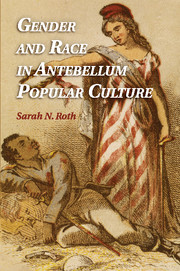
- Publisher:
- Cambridge University Press
- Online publication date:
- August 2014
- Print publication year:
- 2014
- Online ISBN:
- 9781107338852
22 August 2024: Due to technical disruption, we are experiencing some delays to publication. We are working to restore services and apologise for the inconvenience. For further updates please visit our website: https://www.cambridge.org/universitypress/about-us/news-and-blogs/cambridge-university-press-publishing-update-following-technical-disruption


In the decades leading to the Civil War, popular conceptions of African American men shifted dramatically. The savage slave featured in 1830s' novels and stories gave way by the 1850s to the less-threatening humble black martyr. This radical reshaping of black masculinity in American culture occurred at the same time that the reading and writing of popular narratives were emerging as largely feminine enterprises. In a society where women wielded little official power, white female authors exalted white femininity, using narrative forms such as autobiographies, novels, short stories, visual images, and plays, by stressing differences that made white women appear superior to male slaves. This book argues that white women, as creators and consumers of popular culture media, played a pivotal role in the demasculinization of black men during the antebellum period, and consequently had a vital impact on the political landscape of antebellum and Civil War-era America through their powerful influence on popular culture.
‘Filled with surprises and discoveries, Sarah Roth’s book shows us antebellum American literature in a new light. Exploring the intricate dance between representations of white women and black men, Roth shows novels struggling to make sense of American society as it lurched from one decade, and crisis, to another.’
Edward Ayers - President and Professor of History, University of Richmond
‘Sarah Roth’s Gender and Race in Antebellum Popular Culture presents a grand - and bold - narrative about African American citizenship and the causes of Civil War that puts elite women at the center of the story … The book, based on an extraordinary range of sources, challenges key ideas about the agency of black men, white women, and proslavery Southerners. It poses a bold challenge to the dominant ideas about how much women, slaves, and proslavery thinkers influenced the nation’s actions from 1830 to 1870. Roth promises to ignite debate over how cultural ideas about African Americans arose, how they changed, and how those ideas and images changed our country.’
Alfred L. Brophy - Judge John J. Parker Distinguished Professor of Law, University of North Carolina School of Law
‘Brimming with astute and wonderfully suggestive insights about the changing images of black men and white women in antebellum fiction about slavery, Sarah Roth’s fascinating new book is a most welcome addition to the literature on antebellum America.’
Michael Holt - Williams Professor of American History Emeritus, University of Virginia
'Roth’s study is informative, highly readable, and an important contribution. Her analyses never eclipse the integrity of the literature and she is especially adept at providing clear and succinct summaries. The book is suitable for history, literature, and American studies courses because Roth’s provocative arguments will propel much debate.'
Linda M. Grasso Source: The American Historical Review
'… Roth’s study stands as a signal contribution to the scholarship on antebellum race and gender through its identification of a pattern that not only reflected but also informed the political relationship of two disfranchised groups.'
Source: The Journal of American History
 Loading metrics...
Loading metrics...
* Views captured on Cambridge Core between #date#. This data will be updated every 24 hours.
Usage data cannot currently be displayed.